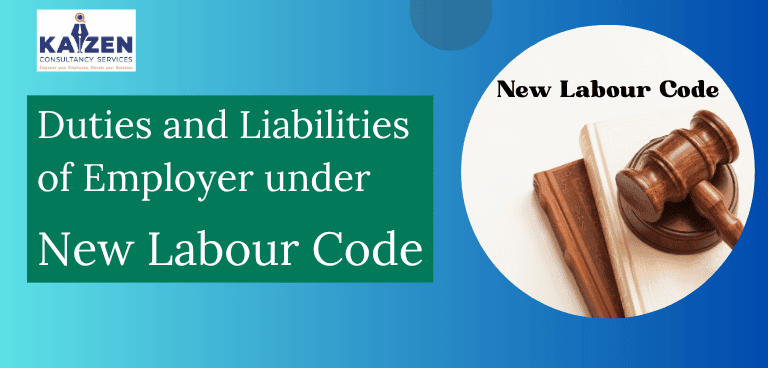Duties and Liabilities of Employer
under New Labour Code
The new Labour Codes in India— implemented to streamline and unify 29 previous statutes— set forth clear duties and liabilities for employers, with defined returns, forms, dates, and penalties for non-compliance. Below is a structured guide highlighting every Duties and Liabilities of employer under Labour Code, responsibilities under each major code for 2025, referencing key sections, statutory returns, and deadlines explained by a Labour Law Consultant in Mumbai

Code on Wages, 2019
Key Sections:
- Section 6 (Minimum wages)
- Section 15 (Payment of wages)
- Section 26 (Returns)
- Section 53 (Penalties for non-compliance)
Employer Duties:
- Pay minimum wages as notified by government, aligning with the Central or State ‘floor wage’.
- Ensure equal remuneration to all genders (Section 3).
- Pay wages within seventh day after wage period (monthly/weekly).
- Maintain wage registers, issue wage slips.
Mandatory Return:
- Form I: Register of Wages
- Form II: Register of Deductions
- Filed monthly, due by 7th of the following month.
Penalties:
- Fine up to ₹50,000 (first offence); imprisonment up to 3 months or fine up to ₹1,00,000 for repeat offenses.
Code on Social Security, 2020
Key Sections:
- Section 29 (PF/ESI Contributions)
- Section 125 (Limitation for proceedings)
- Section 142 (Returns and Records)
- Section 145 (Joint liability—business transfer)
- Section 153 (Penalties and prosecution)
Employer Duties:
- Register employees for Provident Fund (EPF), ESI, Gratuity, etc.
- Deposit contributions by 15th of every month (EPF/ESI returns).
- File ECR (Electronic Challan cum Return) and maintain Form 3A (monthly), Form 6A (annual for EPF); ESI Form 5.
Mandatory Returns:
- EPF: ECR monthly, Form 6A annual (by 30th April)
- ESI: Form 5 (half-yearly, May & November)
Penalties:
- Imprisonment up to 3 years or fine up to ₹3,00,000 for defaults.
Occupational Safety, Health & Working Conditions Code, 2020
Key Sections:
- Section 6 (Registration of Establishments)
- Section 13 (Duties of employer)
- Section 122 (Returns)
- Section 111 (Penalties)
Employer Duties:
- Register the establishment online (within 60 days of starting operations).
- Ensure workplace safety—sanitation, ventilation, first aid, health checks.
- Maintain Form 7 (Health Register), Form 8 (Safety Reports).
Mandatory Returns:
- Annual safety return: Form 13, due by January 31 each year.
Penalties:
- Fine up to ₹2,00,000 per violation, imprisonment up to 2 years for grave offenses.
Industrial Relations Code, 2020
Key Sections:
- Section 31 (Notice of change)
- Section 34 (Grievance Redressal Committee)
- Section 55 (Submission of returns)
- Section 94 (Penalties)
Employer Duties:
- Notify government and employees of any changes (Form VI-A, 21 days prior).
- Implement Standing Orders; maintain Grievance Redressal Committee (Section 4).
- File monthly and annual returns (Form III, Form IV).
Mandatory Returns:
- Form III: Monthly employment details
- Form IV: Annual return, due by 31st January.
Penalties:
Fines ranging ₹1,00,000–₹5,00,000; repeat offenses up to ₹10,00,000; possible imprisonment.

Additional Duties & Liabilities
- Every employer must maintain all prescribed registers, books, and digital records for 5+ years as per Section 142 of the Social Security Code.
- Employers must file all returns electronically via designated government portals (EPFO, ESIC, Labour Department, etc.).
- Section 51 of relevant codes requires employers to allow Inspector-cum-Facilitator access for facilitation, inspection, and online audits.
Additional Duties & Liabilities
Labour Code | Key Forms | Return Due Date | Important Sections | Penalty (Max) | Remarks |
Wages | Form I, II | 7th monthly | Sec. 6, 26, 53 | ₹1,00,000 | Wage slip must be issued to all |
Social Sec. | ECR, 3A, 6A, 5 | By 15th monthly/Apr 30 | Sec. 29, 125, 142, 153 | ₹3,00,000 + jail | ESI half-yearly |
OSH | 7, 8, 13 | 31st Jan yearly | Sec. 6, 13, 122, 111 | ₹2,00,000 | Health checks, safety training req. |
IR | VI-A, III, IV | 21 days/31st Jan | Sec. 31, 34, 55, 94 | ₹10,00,000 | Standing orders, GRC mandatory |
Code on Wages, 2019
- Non-payment of minimum wages, overtime, or bonus:
Fine up to ₹50,000 for first offense; repeat violation can lead to imprisonment up to 3 months or a fine of ₹1,00,000. - Improper maintenance of wage records/slips:
Fine up to ₹10,000 (first default), and up to ₹25,000 or imprisonment for repeat offences. - Obstruction of Inspector-cum-Facilitator:
Fine up to ₹1,00,000 or imprisonment in serious/repeated cases. - Compensation for wage claim:
Up to 10× the claimed amount can be awarded.
Code on Social Security, 2020
- Failure to pay contributions (EPF, ESI, gratuity, etc.):
Imprisonment up to 3 years or fine up to ₹3,00,000 for repeat offenses. - Obstructing social security authorities:
Fines and/or imprisonment depending on severity. - General noncompliance:
Penalties vary; certain offences are compoundable with payment of a percentage of the maximum fine.
Occupational Safety, Health & Working Conditions (OSH) Code, 2020
- Unsafe work conditions & breaches of safety norms:
Fine up to ₹2,00,000 per violation, imprisonment up to 2 years in serious cases. - Causing workplace accidents/fatalities due to negligence:
Higher criminal liability, including possible jail term and business closure. - Ignoring mandatory health measures and training:
Fines, and possible suspension of operating license.
Industrial Relations Code, 2020
- Illegal closures/layoffs without due process:
Fines from ₹1,00,000–₹5,00,000; repeat offenses up to ₹10,00,000. - Failure to maintain standing orders or form a Grievance Redressal Committee:
Fines of ₹25,000–₹1,00,000; prosecution for subsequent defaults. - Ignoring tribunal awards/settlement directions:
Fine of ₹1,00,000 and/or imprisonment; mandatory prosecution for repeat offences. - Unfair victimisation or labour practices:
Fines and criminal prosecution under Schedule II/III.
General Notes
- Repeat or severe offenses: Carry heavier penalties, including enhanced fines, imprisonment, suspension or cancellation of business licenses.
- Directors and officers responsible for day-to-day management can also be held personally liable.
- Workers: May pursue claims for compensation, reinstatement, or legal action through tribunals and labour courts.
Penalties have grown significantly under the new Labour Codes to deter non-compliance and ensure the protection of labour rights in India.
Employers must recognize that India’s new Labour Codes sharply increase transparency and accountability. By understanding and efficiently discharging their duties, businesses reduce legal risk, win employee trust, and strengthen operational stability. Compliance is no longer just about avoiding penalties—it is a strategic imperative for long-term success and reputation in 2025 and beyond.
Connect to Kaizen Consultancy Services to avoid any Penalties for Labour Law Compliance
